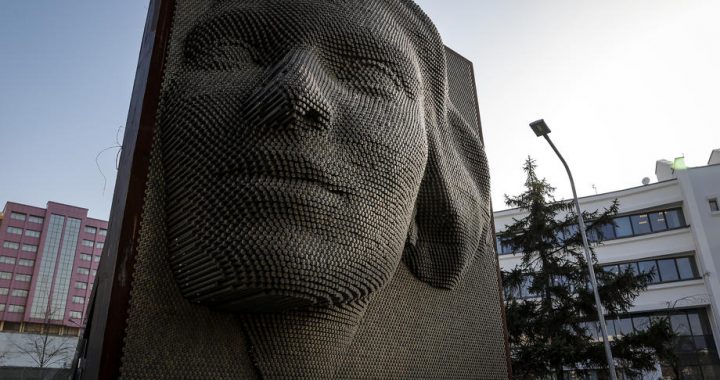

 The ‘Heroines’ memorial to Kosovo Albanian wartime rape survivors in Pristina. Photo: EPA-EFE/VALDRIN XHEMAJ.
The ‘Heroines’ memorial to Kosovo Albanian wartime rape survivors in Pristina. Photo: EPA-EFE/VALDRIN XHEMAJ.
After gathering data from 900 survivors of wartime sexual assault, the Kosovo Rehabilitation Centre for Torture Victims concluded that rape was used as a weapon of war during the Kosovo conflict.
The Kosovo Rehabilitation Centre for Torture Victims KRCT, told BIRN that its research into victims of wartime sexual assault has led to the conclusion that rape was systematically used as a weapon during the 1998-99 conflict.
“Rape as a war crime was undoubtedly used as a weapon of war,” said Fatmire Haliti, project coordinator at KRCT.
The findings of the research, which was published last week, revealed that half of the 900 sexual abuse cases that the KRCT has documented were committed in what it called ‘rape houses’, where women were temporarily held to be assaulted, and that in 621 cases, they were sexually abused by more than one perpetrator.
In the vast majority of the cases documented by the KRCT, the victims were women, but 56 out of 900 victims were men.
Around 135 of the victims were under the age of 18 when they were sexually assaulted.
Rural areas were the worst affected, with around 603 of the sexual abuse cases during the Kosovo war having occurred in villages.
“The data from the documentation is intended to serve all institutional and non-institutional mechanisms, as well as the survivors themselves. The data is public in the form of statistics and it can be used for access to justice,” Haliti said.
The KRCT is continuing to gather data, but Haliti said that she doesn’t think a definitive number of cases of victims of wartime sexual violence in Kosovo will ever be established.
“One of the main reasons is that many survivors have passed away (23 years after the end of the war); some survivors died during the war, from wounds or other consequences; some of the survivors have left Kosovo and are no longer accessible, and so on,” she explained.
Of the 900 sexual abuse victims documented by the KRCT, 35 women became pregnant as a consequence of being raped.
BIRN reported in 2019 that babies born to Kosovo Albanian women raped by Serbian forces during wartime have often been kept secret, given up for adoption or raised in orphanages, while the few mothers who agreed to talk anonymously said that they remain terrified of public exposure.
In 2018, after new legislation was adopted, the Kosovo authorities began receiving applications for the status of survivor of wartime sexual violence. Being granted the status not only bestows official recognition of a victim’s suffering, but also makes them eligible for benefits such as monthly payments of 230 euros.
Since it started work, the government’s Commission to Recognise and Verify Survivors of Sexual Violence during the war has received more than 1,200 applications.
More than 900 of the applicants have been granted the status of wartime victim of sexual violence, while more than 200 applications have been rejected.
26 October 2022 - 13:51

A pregnant woman who had received a protection order from the courts w...

Virginity testing is now a criminal offence in Kosovo. The practice is...

After gathering data from 900 survivors of wartime sexual assault, the...

For the third time in a week, protests have been held over the rape of...